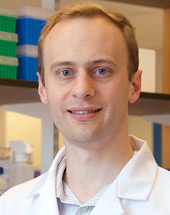Kevin Esvelt, PhD

An Oregon native, Kevin transformed an early interest in paleontology into a passion for the life sciences. At Harvey Mudd College, he majored in chemistry and biology with an additional focus on unicycling and hang gliding. Supported by a Hertz/NSF Fellowship in the laboratory of David Liu at Harvard, Kevin developed Phage-Assisted Continuous Evolution (PACE) to rapidly evolve new molecular tools. Whereas traditional directed evolution relies on the experimenter laboriously creating new generations of candidate molecules, he devised a means of harnessing the fastest-evolving pattern in nature, the bacteriophage, to continuously evolve proteins and nucleic acids toward desired functions in vivo. By linking phage evolutionary success to the desired molecular activity, PACE can achieve dozens of rounds of molecular evolution in a single day without researcher intervention.
As a Technology Development Fellow of the Wyss Institute, Kevin has focused on merging the fields of molecular biology and ecological engineering. He has developed several key technologies utilizing the RNA-guided CRISPR/Cas9 nuclease for genome engineering and regulation in collaboration with George Church’s laboratory. Most notably, he has outlined how CRISPR might be used to build RNA-guided gene drives capable of spreading almost any genomic alteration through populations. It may allow us to deliberately alter the traits of wild organisms and therefore reshape ecosystems. For example, gene drives might be used to render mosquito populations unable to transmit malaria or dengue, genetically control or eradicate populations of invasive species, and reverse the evolution of pesticide and herbicide resistance in insects and weeds. Other projects involve combining phages with Cas9 to stably engineer microbial ecosystems and employing horizontal gene transfer for population genome engineering. Finally, he is working to ensure that gene drives and other powerful self-propagating biologics are employed in an transparent, responsible, and well-regulated manner.
Graduate Studies
Undergraduate Studies
Awards
2004, Graduate Research Fellowship Program, National Science Foundation
2010, Hertz Thesis Prize, Fannie & John Hertz Foundation
2016, TR35, MIT Technology Review
2017, Director’s New Innovator Award, National Institutes of Health
2018, Sloan Research Fellow, Alfred P. Sloan Foundation
Related News
